Father’s Day is upon us.
The greatest novel about fathers that I’ve ever read is To Kill a Mockingbird by Harper Lee. Here are five more.
The Poisonwood Bible by Barbara Kingsolver
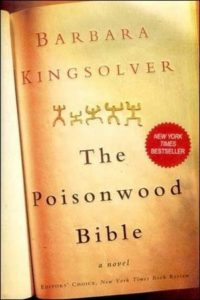 In 1959 evangelical Baptist preacher Nathan Price takes his wife and four daughters to the Belgian Congo to deliver God’s message. They take with them as many possessions as possible—everything from garden seeds to boxes of cake mix—only to find that they are completely unprepared for their new life. Rev. Price insists on trying to pound the round peg of his American way of life into the square hole of the African environment, refusing, for example, to plant seeds as the local inhabitants try to teach him to prevent the plants from being washed away by the area’s torrential rains.
In 1959 evangelical Baptist preacher Nathan Price takes his wife and four daughters to the Belgian Congo to deliver God’s message. They take with them as many possessions as possible—everything from garden seeds to boxes of cake mix—only to find that they are completely unprepared for their new life. Rev. Price insists on trying to pound the round peg of his American way of life into the square hole of the African environment, refusing, for example, to plant seeds as the local inhabitants try to teach him to prevent the plants from being washed away by the area’s torrential rains.
The book is narrated alternately by Price’s wife and daughters as they describe their life in Africa over the next 30 years. Kingsolver convincingly creates a distinct, distinguishing voice for each character. The use of multiple narrators has become common in contemporary novels. This is the book I always use as my touchstone for evaluating how successfully other authors create multiple voices in their fiction.
Father Melancholy’s Daughter by Gail Godwin
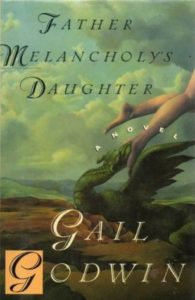 This memorable novel tells the story of Margaret, a young woman coming of age during the 1970s in the southern state of Virginia in the U.S. Margaret is the daughter of an Episcopal priest who suffers from periodic bouts of severe depression—the melancholy of the book’s title. When Margaret was a young child, her mother left home for a vacation that gradually extended to a year before the mother was killed in an auto accident.
This memorable novel tells the story of Margaret, a young woman coming of age during the 1970s in the southern state of Virginia in the U.S. Margaret is the daughter of an Episcopal priest who suffers from periodic bouts of severe depression—the melancholy of the book’s title. When Margaret was a young child, her mother left home for a vacation that gradually extended to a year before the mother was killed in an auto accident.
Despite the father’s religious vocation—and it is a strong and recurrent theme throughout the novel—this is the story of the strong relationship between a father and his daughter. Although religion figures prominently in the family’s story, the novel is never preachy or strident. One of Godwin’s strengths as a novelist is her ability to create a whole universe for her characters to inhabit, and religion here is one of the components of the fictional world. Read Father Melancholy’s Daughter if you love a beautiful story beautifully written.
& Sons by David Gilbert
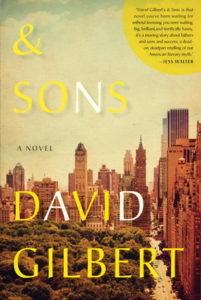 A.N. Dyer is a reclusive author nearing the end of his life when he agrees to deliver the eulogy for Charles Topping, his best friend since early childhood. But during the funeral Dyer breaks down as he realizes the mistakes he has made in his own life. To try to reconnect with his family, he calls together his three sons: two middle-aged men and the 17-year-old love child whose birth broke up his marriage. When the youngest son returns for a break from his exclusive boarding school, the two older sons join him at Dyer’s swank Manhattan home. Charles Topping’s adult son Philip, who grew up circling but never truly absorbed into the famous author’s family, narrates the story of this family reunion.
A.N. Dyer is a reclusive author nearing the end of his life when he agrees to deliver the eulogy for Charles Topping, his best friend since early childhood. But during the funeral Dyer breaks down as he realizes the mistakes he has made in his own life. To try to reconnect with his family, he calls together his three sons: two middle-aged men and the 17-year-old love child whose birth broke up his marriage. When the youngest son returns for a break from his exclusive boarding school, the two older sons join him at Dyer’s swank Manhattan home. Charles Topping’s adult son Philip, who grew up circling but never truly absorbed into the famous author’s family, narrates the story of this family reunion.
As is often the case with novels about novelists, this book considers metafictional questions about the nature of fiction, the publishing world, the writing life, and who has the right to tell a particular story. At times author Gilbert seems to enjoy such considerations a bit too much—“Look what a clever writer I am!” the text often screams. As a student of literature, I enjoyed the metafictional aspects, but I also appreciated the book as what it is at its center, a story about love, friendship, and the relationships between fathers and sons.
The Chatham School Affair by Thomas H. Cook
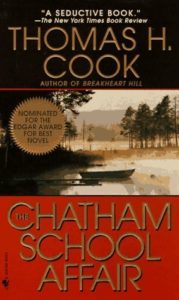 Lawyer Henry Griswald, now in his 70s, narrates this novel about a life-changing event that occurred when he was 15 and a student at the boys’ prep school where his father served as headmaster. As a favor to a friend, his father had hired Elizabeth Channing as the school’s art teacher. From the moment she stepped off the bus in Chatham and moved into an isolated cottage near the lake, the beautiful Miss Channing drew the attention of everyone in the village. The novel gradually builds an atmosphere of foreboding that culminates in tragedy.
Lawyer Henry Griswald, now in his 70s, narrates this novel about a life-changing event that occurred when he was 15 and a student at the boys’ prep school where his father served as headmaster. As a favor to a friend, his father had hired Elizabeth Channing as the school’s art teacher. From the moment she stepped off the bus in Chatham and moved into an isolated cottage near the lake, the beautiful Miss Channing drew the attention of everyone in the village. The novel gradually builds an atmosphere of foreboding that culminates in tragedy.
This book is a mystery in its probing of what really happened on that fateful day. However, it does not move at the breakneck speed of many current mystery or thriller novels. Instead, Henry Griswald takes his time thinking about the event. In a psychologically credible process he circles repeatedly around the tragedy, coming ever closer to the kernel of truth and the resulting self-knowledge at its center. In coming to understand his own involvement, Henry develops some insight into his father, with whom he always had a cold, distant relationship.
The Great Santini by Pat Conroy
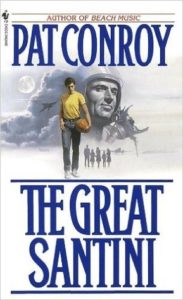 Meet Bull Meecham: U.S. Marine, fighter pilot, Southerner, and absolute master of his home and family. In this autobiographical novel Conroy creates a fully developed character whom, like the fictional family members, readers will both love and hate. Nobody ever does anything well enough to please Bull. The story unfolds over the senior year of high school basketball player Ben, the oldest Meecham child. Like all members of the family, Ben constantly tries both to please his father and to avoid verbal and physical abuse.
Meet Bull Meecham: U.S. Marine, fighter pilot, Southerner, and absolute master of his home and family. In this autobiographical novel Conroy creates a fully developed character whom, like the fictional family members, readers will both love and hate. Nobody ever does anything well enough to please Bull. The story unfolds over the senior year of high school basketball player Ben, the oldest Meecham child. Like all members of the family, Ben constantly tries both to please his father and to avoid verbal and physical abuse.
In addition to his skill at characterization, Conroy is a great descriptive writer. The American South comes to life in this novel, which portrays a flawed human being in all his messiness while eliciting the range of conflicting emotions we often feel for the people closest to us.
© 2017 by Mary Daniels Brown
